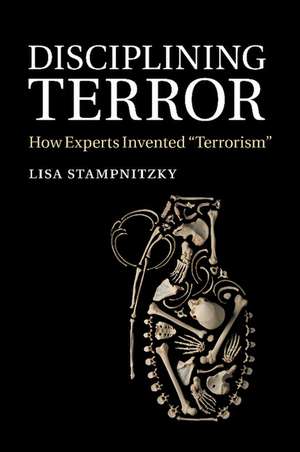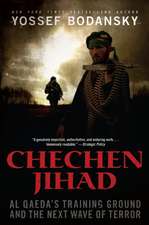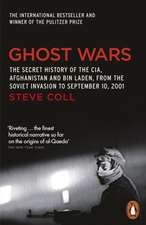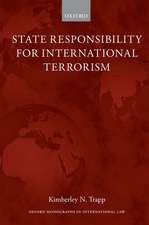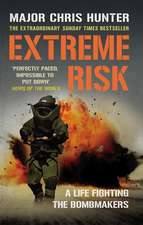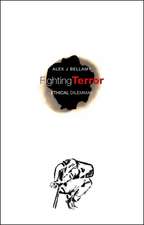Disciplining Terror: How Experts Invented 'Terrorism'
Autor Lisa Stampnitzkyen Limba Engleză Paperback – 20 aug 2014
| Toate formatele și edițiile | Preț | Express |
|---|---|---|
| Paperback (1) | 157.54 lei 3-5 săpt. | |
| Cambridge University Press – 20 aug 2014 | 157.54 lei 3-5 săpt. | |
| Hardback (1) | 693.36 lei 6-8 săpt. | |
| Cambridge University Press – 17 apr 2013 | 693.36 lei 6-8 săpt. |
Preț: 157.54 lei
Nou
Puncte Express: 236
Preț estimativ în valută:
30.15€ • 32.24$ • 25.13£
30.15€ • 32.24$ • 25.13£
Carte disponibilă
Livrare economică 27 martie-10 aprilie
Preluare comenzi: 021 569.72.76
Specificații
ISBN-13: 9781107697348
ISBN-10: 1107697344
Pagini: 246
Ilustrații: 10 b/w illus. 7 tables
Dimensiuni: 152 x 229 x 13 mm
Greutate: 0.34 kg
Editura: Cambridge University Press
Colecția Cambridge University Press
Locul publicării:New York, United States
ISBN-10: 1107697344
Pagini: 246
Ilustrații: 10 b/w illus. 7 tables
Dimensiuni: 152 x 229 x 13 mm
Greutate: 0.34 kg
Editura: Cambridge University Press
Colecția Cambridge University Press
Locul publicării:New York, United States
Cuprins
1. Introduction; 2. The invention of terrorism and the rise of the terrorism expert; 3. From insurgents to terrorists: experts, rational knowledge, and irrational subjects; 4. Disasters, diplomats, and databases: rationalization and its discontents; 5. 'Terrorism fever': the first war on terror and the politicization of expertise; 6. Loose can(n)ons: from 'small wars' to the 'new terrorism'; 7. The road to pre-emption; 8. The politics of (anti)knowledge: disciplining terrorism after 9/11; 9. Conclusion: the trouble with experts.
Recenzii
'I do not know anyone who would have predicted some forty years ago that 'terrorism studies' would emerge as a field, much less that a talented sociologist would devote her attention to producing a fascinating critique of its erratic and contentious development. Lisa Stampnitzky's book is important not just as a disciplined examination of an undisciplined field but as a cautionary tale about the vexed relationship between experts and policy makers.' Martha Crenshaw, Senior Fellow, Center for International Security and Cooperation (CISAC), Stanford University
'Lisa Stampnitzky tells a truly fascinating and revelatory story about how 'terrorism' came to occupy a prominent place in contemporary politics and culture. Theoretically sophisticated, meticulously researched and eloquently written, Disciplining Terror represents a quantum leap forward in our understanding of the rise and evolution of the so-called 'terrorism experts'.' Richard Jackson, editor of Critical Studies on Terrorism
'In a riveting account, Disciplining Terror asks how a new breed of expert formulated the nightmare concept of 'terrorism'. Investigating how hijackings and hostage-taking, bombings and guerrilla warfare came to constitute a new, socially defined category, Lisa Stampnitzky traces how we ended up not in a war against particular enemies but in a war against a concept, a War on Terror. This brilliant, deeply researched analysis demystifies a fundamental obsession of our political culture.' Ann Swidler, University of California, Berkeley
'In this excellent and highly readable book, Stampnitzky traces the origin of terrorism studies as a discipline … The book does an admirable job of tracing the origins of terrorism studies from the 1960s - when it was a more conventional if nascent endeavor focused mainly on insurgencies and terrorism as a tactic - to the current post-9/11 state of affairs. This excellent work employs an array of primary and secondary sources and is a corrective that should be read by US foreign policy elites especially. Summing up: highly recommended.' J. Fields, Choice
'I do consider this book as one of the best and pungent arguments which escapes from simplistic causal explanations or media misconceptions as a whole portion of literature falls. Truthfully, it represents a first step in order to decipher the complex intersection of the experts and their networks with the constructed fields. The question whether Western civilization rested on the dichotomy between rationalization and its discontents, a point widely discussed throughout Disciplining Terror. Hence it exhibits as a helpful book for politicians, social scientists and policy makers interested in understanding terrorism as a cultural phenomenon.' Maximiliano Emanuel Korstanje, International Journal of Risk and Contingency Management
'Lisa Stampnitzky tells a truly fascinating and revelatory story about how 'terrorism' came to occupy a prominent place in contemporary politics and culture. Theoretically sophisticated, meticulously researched and eloquently written, Disciplining Terror represents a quantum leap forward in our understanding of the rise and evolution of the so-called 'terrorism experts'.' Richard Jackson, editor of Critical Studies on Terrorism
'In a riveting account, Disciplining Terror asks how a new breed of expert formulated the nightmare concept of 'terrorism'. Investigating how hijackings and hostage-taking, bombings and guerrilla warfare came to constitute a new, socially defined category, Lisa Stampnitzky traces how we ended up not in a war against particular enemies but in a war against a concept, a War on Terror. This brilliant, deeply researched analysis demystifies a fundamental obsession of our political culture.' Ann Swidler, University of California, Berkeley
'In this excellent and highly readable book, Stampnitzky traces the origin of terrorism studies as a discipline … The book does an admirable job of tracing the origins of terrorism studies from the 1960s - when it was a more conventional if nascent endeavor focused mainly on insurgencies and terrorism as a tactic - to the current post-9/11 state of affairs. This excellent work employs an array of primary and secondary sources and is a corrective that should be read by US foreign policy elites especially. Summing up: highly recommended.' J. Fields, Choice
'I do consider this book as one of the best and pungent arguments which escapes from simplistic causal explanations or media misconceptions as a whole portion of literature falls. Truthfully, it represents a first step in order to decipher the complex intersection of the experts and their networks with the constructed fields. The question whether Western civilization rested on the dichotomy between rationalization and its discontents, a point widely discussed throughout Disciplining Terror. Hence it exhibits as a helpful book for politicians, social scientists and policy makers interested in understanding terrorism as a cultural phenomenon.' Maximiliano Emanuel Korstanje, International Journal of Risk and Contingency Management
Notă biografică
Descriere
Examines how political violence became 'terrorism', and how this transformation ultimately led to the current 'war on terror'.
